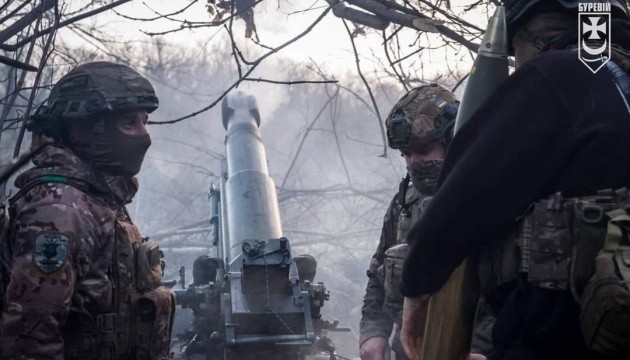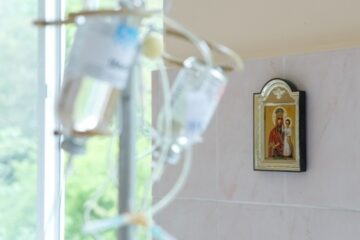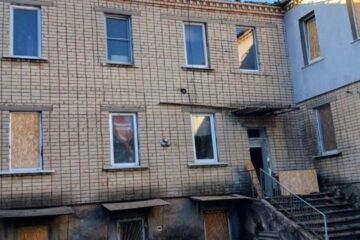The first military units from North Korea are set to be deployed for combat in the Russo-Ukrainian war as early as October 27-28. Ukraine is set to receive $50 billion in G7/EU loan by year’s end
MAIN EVENTS OF THE WEEK
Armed Forces Chief Commander, Oleksandr Syrsky refuted as untrue the allegations made by Russia’s president Putin at the BRICS Summit regarding the purported encirclement of Ukrainian troops in the Kursk region. Ukrainian forces continue active operations on the Kursk front, degrading the enemy’s warfighting capability for the third month in a row, Syrsky said.
The European Parliament voted in favor of a resolution to establish Ukraine Loan Cooperation Mechanism of up to €45 billion, and an exceptional Macro-Financial Assistance (MFA) loan of up to €35 billion. This package leverages windfall proceeds from immobilised Russian sovereign assets, sending a clear signal that the burden of rebuilding Ukraine will be shouldered by those responsible for its destruction. This approach will be applied for the first time in a structured way and at such a scale across EU and G7 lenders, ensuring long-term, stable financial support for Ukraine’s recovery and resilience.
October 25: Ukraine presented its letter of ratification of the Rome Statute of the International Criminal Court to the UN Secretariat. Thus, Ukraine has become a State Party to the International Criminal Court.
October 24: Military units from North Korea have left their Russian training grounds and entered the zone of combat between Russian and Ukraine forces for the first time, the defense intelligence service of Ukraine (HUR) said in a Thursday evening statement. Ukrainian spies spotted the troops in Russia’s Kursk region on Wednesday, HUR said. North Korean (DPRK) soldiers are being trained at five military sites in the far east of Russia, and will have to pass a training course lasting several weeks before being deployed in the war against Ukraine, HUR said. The Pentagon Chief, Lloyd Austin confirmed Wednesday that thousands of North Koreans are training in Russia alongside Kremlin troops. According to updated estimates from Kyiv, Pyongyang has transferred about 12,000 troops to Russia, including 500 officers and three army generals. Earlier this week President Volodymyr Zelensky said Ukraine had already spotted North Korean army officers in the Russian-occupied territories of Ukraine’s eastern region of Donbas. Russian President Vladimir Putin has not confirmed or denied the presence of DPRK troops in his country. At the BRICS summit on Thursday, the Kremlin leader said it was “not Russia’s actions that led to the escalation,” and accused Western countries of helping Ukraine fight Moscow. North Korea said Friday that any troop deployment to Russia would be in line with international law, state media reported, but stopped short of confirming it had sent soldiers. “If there is such a thing that the world media is talking about, I think it will be an act conforming with the regulations of international law,” said Kim Jong Gyu, vice foreign minister in charge of Russian Affairs, according to the official Korean Central News Agency.
COMMENT: Borys Babin, international lawyer: “Whatever the circumstances, DPRK ‘soldiers’, even if mercenaries, are combatants, both in terms of legitimate targets and judicial guarantees for prisoners of war.”
October 22: Ukrainian Prosecutor General Andriy Kostin resigned on Tuesday in the wake of a lurid scandal in which public officials allegedly used bogus disability certificates to get more generous pensions from the state and possibly evade being drafted to fight Russian troops. After Ukrainian media broke the scandal last week, the Office of the General Prosecutor launched an internal investigation that led to a wave of inspections throughout Ukraine’s public sector. Overall, some 64 state medical commissioners have been issued with “notes of suspicion. Some 4,000 disability certificates were canceled after the audit, the Security Service of Ukraine (SBU) said Tuesday. President Volodymyr Zelensky demanded Kostin take political responsibility for the scandal. “Many shameful facts of abuse have been established in the system of the prosecutor’s office of Ukraine,” Kostin said in a statement Tuesday, “The President is correct … not only should all illegal decisions regarding the granting of disabilities, corresponding pensions and other payments be canceled. [But] clear legislative and organizational changes should [also] come, as well as political responsibility”. “I am grateful to the President of Ukraine and to the [parliament] of Ukraine for their trust. But in this situation, I think it is correct to announce [my] departure from the position of Prosecutor General,” he added.
October 23: Ukraine has received a tranche of nearly $1.1 billion from the International Monetary Fund (IMF) after the successful completion of the fifth program revision, Prime Minister Denys Shmyhal said Wednesday. “The funds will be used to cover critical non-military budget spending,” Shmyhal said.
October 24: UN Secretary General Antonio Guterres met Russian president Vladimir Putin for the first time in over two years on Thursday, as the Russian president faced calls from his BRICS allies to end the conflict in Ukraine. The meeting took place on the final day of the BRICS summit in the Russian city of Kazan, a forum Moscow hopes will help forge a united front of emerging economies against the West. During his visit, Guterres called for a “just peace” in Ukraine and reiterated his position to Putin that Russia’s invasion of the country was in “violation of the United Nations Charter and international law”. Guterres’ visit to Russia drew an angry response from Ukraine. In a statement ahead of Guterres’ visit to Kazan, the Ukrainian foreign ministry said: “This is a wrong choice that does not advance the cause of peace. It only damages the UN’s reputation.” Ukrainian President Volodymyr Zelensky has rejected a visit to Ukraine by UN Secretary General António Guterres over his trip to Russia. After attending a BRICS summit in the Russian city of Kazan this week, Guterres had intended to visit Kyiv. “The UN secretary general declined Ukraine’s invitation to attend the first Ukraine Peace Summit in Switzerland. He did, however, accept the invitation to Kazan from war criminal Putin,” the statement added.
COMMENT: Ruslan Stefanchuk, Verkhovna Rada Speaker: “An oxymoron. Antonio Guterres, the Secretary General the organization whose mission is to secure and strengthen international law, is going to Kazan to meet an international criminal”.
President Volodymyr Zelensky does not intend to sign a bill abolishing seasonal daylight saving time in Ukraine. The Verkhovna Rada passed the bill on July 16, which aimed to cancel to daylight saving time as part of a draft law on time calculation and calendar. The draft law provides that Ukrainians would set their clocks back one hour for the last time on Oct. 27, 2024, and will not revert back to summer time next spring.
At the BRICS summit in Kazan, Putin tried to take advantage of Russia’s presidency of the BRICS to demonstrate his country’s alleged exit from international isolation over its war in Ukraine, but the final documents of this summit show that this attempt failed again. Ukraine’s Foreign Ministry believes that “Moscow’s attempts to impose the notion of an alternative position of the so-called Global South regarding Russia’s aggression against Ukraine have once again failed. The final declaration demonstrated that BRICS, as an alliance, does not have a unified policy on Russia’s aggression against Ukraine. We are convinced this is due to the majority of these countries supporting the goals and principles of the UN Charter, as mentioned in the statement. Such support is incompatible with supporting aggression or changing borders by force, and therefore incompatible with supporting Russia and its war of aggression against Ukraine”, the ministry said in a statement.
COMMENT: Oleksandr Kovalenko, defense and policy analyst at the Information Resistance group: “This summit was useful in that it deepened the division and the lack of understanding among members of the club. This is evidenced at least by the fact that Russia’s pulling of blanket toward itself on China’s regional priorities made it clear to Xi Jinping, that the floor in his own kitchen is knocked out from under his feet. How will the leader of the Celestial Empire respond to this situation? Well, definitely not to the benefit of either Putin or Un.”
October 24: the Third Parliamentary Summit of the Crimea Platform was held in Riga, the capital of Latvia, gathering over 70 delegations from some 50 countries and six international parliamentary assemblies, including 36 heads of parliaments, both in-person and online. After the plenary session, the participants adopted a Joint Declaration, in which they strongly condemned the Russian Federation’s war of aggression against Ukraine. The participants reaffirmed their unwavering support for Ukraine’s sovereignty and territorial integrity, stressing the necessity of liberating all seized territories, including Crimea, from Russian occupation. The declaration emphasized the non-recognition of illegal “referenda” and “elections,” condemned human rights violations, political persecution, and deportations, and called for the intensification of international sanctions. The participants pledged to continue supporting Ukraine at the parliamentary level, promoting the implementation of the Peace Formula and Victory Plan, and ensuring Russia’s accountability for war crimes. The Speaker of the Ukrainian Parliament, the Verkhovna Rada, Ruslan Stefanchuk, during his speech at the 3rd summit, said that Ukraine will never give up Crimea, just as it will not give up any of currently Russian occupied areas in Ukraine.
THE WAR AS IT IS
October 21/ Interview. Victory Commanders: Sapper Artem Yevtushenko: Every sapper dreams of blowing up the Kerch Strait Bridge
[embedded content]
October 22/ Interview. A Nation of the Invincible: Movie director Oles Sanin about film-making amid war, a strong home front and life after victory
[embedded content]
October 23/ Station Kramatorsk. Interview: Andriy Otchichenko, aka Chichen, on artillery warfare, Aidar Battalion, drunk driving and imperfect justice
[embedded content]
October 24/ Dzhyhun. Shorts: Why are some NATO countries opposing Ukraine’s joining the Alliance?
[embedded content]
October 21 “Let’s secure the sky with nets” charity campaign of weaving camouflage nets, Vinnytsia city

October 24/ The PhotoHH Alley of fallen soldiers was launched in Heroes’ Park, Dnipro city
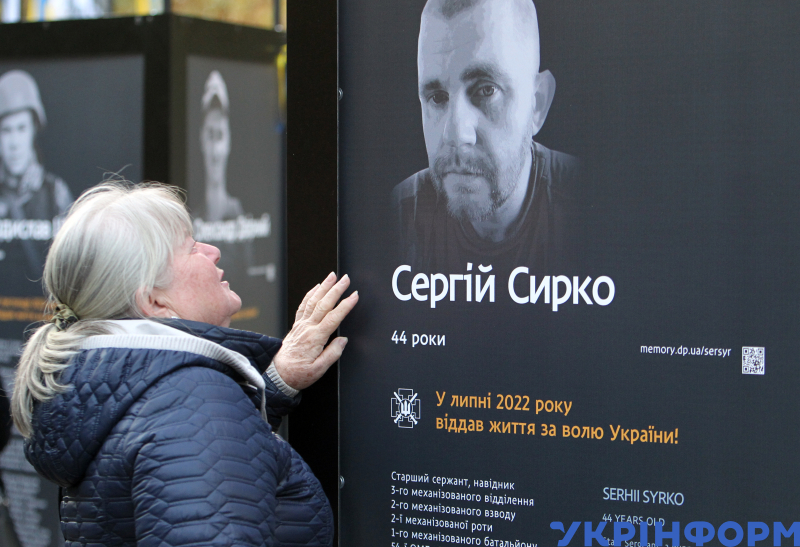
October 25/ A young girl died in Kyiv in the aftermath of fire caused by Russian drone strike
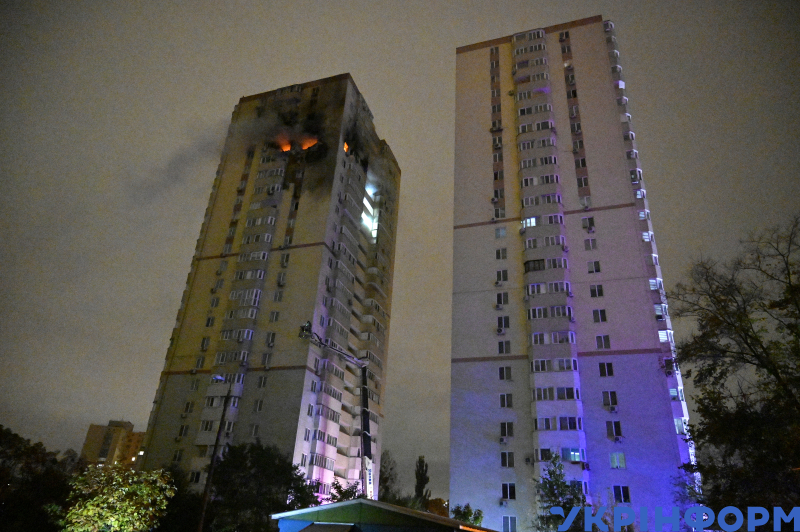
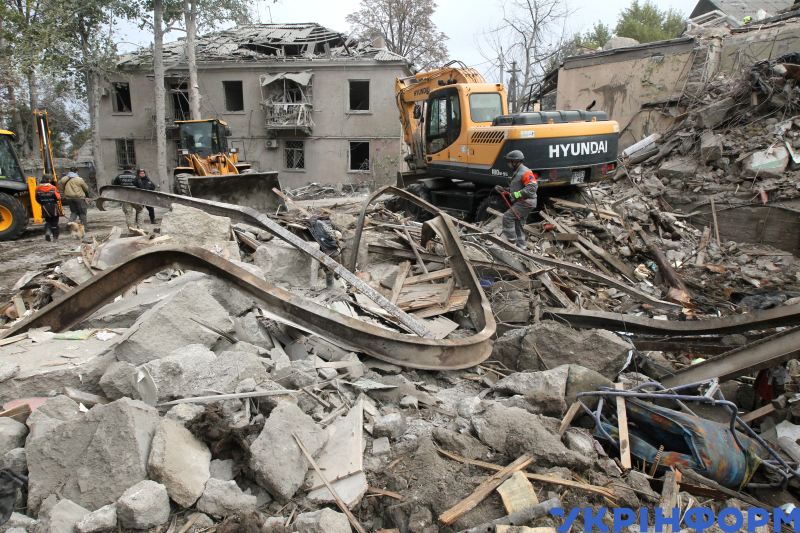
October 25/ The aftermath of an air attack by Russia on Dnipro’s Novokadatsky District
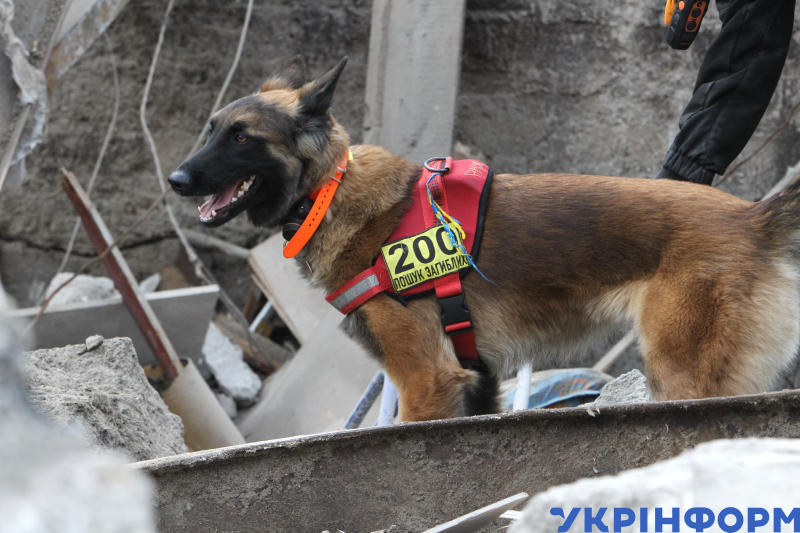
October 26/ In Dnipro, search dogs discovered a woman’s body under the rubble of a building struck by a Russian launched bomb
UKRAINIAN BATTLEFIELDS
Armed Forces Supreme Commander Volodymyr Zelensky:
October 21: met and talked with Minister of Defense Rustem Umerov, Armed Forces Chief Commander Oleksandr Syrsky and Chief of the General Staff Anatoly Barhylevych;
October 24: chaired the Supreme Commander’s Headquarters meeting addressing, among other issues, preparations for the upcoming heating season and the development of an internal Strengthening Plan for Ukraine;
October 25: listened to a report from the Armed Forces Chief Commander Oleksandr Syrsky, who shared intelligence indicating that the first military units from North Korea are set to be deployed for combat in the Russo-Ukrainian war as early as October 27-28.
***
Ukrainian attacks on the Russian Federation and Russian occupied Ukraine
October 24: Ukrainian launched drones attacked and damaged a mobile radar station used by the 31st Division of the Russian Air Defense Forces, which is stationed a few kilometers from the village of Olenivka, Crimea.
October 26: Ukraine’s military deployed an attack with drones targeting an air base located in the surroundings of the Russian city of Lipetsk.
October 22: Overrnight drone attacks caused an explosion and a fire at an ethanol manufacturing plant and damaged two other alcohol producing enterprises in Russia on Tuesday.
A blast shook the Biochim biochemical plant in Russia’s Tambov region, sparking a short-lived fire. Russia’s defence ministry said that its air defence units shot down a total of 18 Ukrainian drones, but it did not mention Tambov in its tally. Biochim in the Tambov region, some 450 km (280 miles) southeast of Moscow, is one of Russia’s oldest manufacturers of “products of strategic importance for the state,” chiefly ethanol, according to the company’s website.
The governor of the Tula region, which borders Moscow to its north, said on Tuesday that a Ukrainain drone attack damaged two distilleries, in the town of Yefremov and the village of Luzhkovskyi.
There were also reports of explosions and resulting fire nearby the Yefremov thermal power plant and an industrial enterprise in the Voronezh region.
October 21: Unmanned Systems Forces, in a coordinated effort with other elements of the Defense Forces, attacked and hit a hostile Buk-M3 SAM system deployed 60 kilometers from the line of battle, the Armed Forces General Staff reported. The value of a Buk-M3 system can reach $40-$50 million.
October 27: Russia’s Defense Ministry claimed to have downed 51 Ukrainian drones overnight on Sunday, with 18 of them allegedly intercepted over western Tambov Oblast. Drones struck the Michurinsky district, causing a fire that was quickly extinguished, Governor Maxim Egorov claimed on his Telegram channel. Local residents reported a fire that broke out at the Transneft Druzhba control station in the village of Novonikolskoye. Transneft Druzhba is a subsidiary of Russia’s Transneft, which operates the Druzhba pipeline, built to funnel Russian oil to European countries via Belarus and Ukraine. The village of Novonikolskoye is also home to the Michurinsky Oil Refinery.
October 21: The Kremniy El microelectronics factory caught fire in the Russian city of Bryansk following a Ukrainian drone strike overnight on Monday, Russian and Ukrainian media reported. This factory is one of the largest producers and suppliers of microelectronics in Russia, serving as a key supplier to the Russian Ministry of Defense. One of the primary products relying on Kremniy’s microelectronic components is Russia’s tactical and strategic missiles, such as the Iskander and Kalibr systems. Precise sensors and chips made at Kremniy are used for navigation and flight control, enabling these missiles and other guided munitions to hit their targets with high accuracy. Additionally, components from the factory are essential for the functioning of missile defense systems like the S-400, S-500, and Pantsir. The plant is located over 100 kilometers (about 62 miles) north of the border with Ukraine’s northern Sumy Oblast. It was the fifth attack on the factory since August 2023, when it was attacked for the first time. A statement issued by Kremniy El on Monday revealed that production at the factory had been halted, energy supplies disrupted and technological chains interrupted amid the aftermath of the attack. No information was available as to when the factory could resume its production operations.
HOSTILITIES
Since early October 2024, the pace of advance of the Russian forces towards Pokrovsk had slowed down significantly, with the Russian advance stalled at approximately 7 km from the town. Russian Armed Forces have recently directed resources towards the southern part of this front, targeting Selydove and partially encircling the town. According to British military analysts, Russia likely aims to use the E50 highway as a secondary route of advance to Pokrovsk if Selydove falls.
October 23: Russian soldiers have been heard raising concerns about how North Korean soldiers will be commanded and provided with ammunition and military kit, leaked intercepts obtained by the Defense Intelligence of Ukraine (HUR) and released on Friday show. The Russian soldiers talk disdainfully about the incoming North Korean soldiers, codenamed the “K Battalion,” at one point referring to them as “the f**king Chinese.” In the same extract, a serviceman describes another who has been tasked to “meet people.” “And he’s like standing there with his eyes out, like… f**k,” the soldier says. “He came here and says what the f**k to do with them.” The audio was intercepted from encrypted Russian transmission channels on Wednesady night, according to HUR. Ukraine’s analysis of the intercepts revealed that North Korean troop movements were planned for the morning of October 24, in the area of Postoyalye Dvory field camp in Russia’s Kursk region, where Ukraine launched a surprise incursion in early August this year. The intercepts also reveal plans to have one interpreter and three senior officers for every 30 North Korean personnel, which the Russian soldiers are heard in the audio condemning. “The only thing I don’t understand is that there [should be] three senior officers for 30 people. Where do we get them? We’ll have to pull them out,” one Russian serviceman says. “I’m f***ing telling you, there are 77 battalion commanders coming in tomorrow, there are commanders, deputy commanders and so on,” a serviceman says in another extract. The intercepted audio follows a Thursday announcement from Ukraine’s defense intelligence service that a group of North Korean soldiers have been spotted in Russia’s Kursk region, an area that borders Ukraine and has seen ongoing military operations.
October 22: The press service for the 24th King Danylo Independent Mechanized Brigade dismissed the news that Russian troops had allegedly managed to breach through Ukrainian defensive lines nearby the town of Chasiv Yar, the Donetsk region.
October 21: The MoD gave approval to deployment of the locally-made Varan buggy to Ukraine’s Armed Forces. A fully indigenous product, this all-terrain vehicle will be used for transporting personnel, evacuating the wounded, delivering ammunition and other supplies. The Varan is designed to travel across extremely challenging terrains.
October 21: Soldiers from the 150th Independent Mechanized Brigade deployed drones to eliminate a Russian subversive and reconnaissance group who were holed up in a house on the outskirts of Toretsk.
October 21: On the Kurakhove Front, Ukraine’s assault troops fended off a Russian assault on the surroundings of Maksymilianivka village, having taken out four enemy tanks and five armored fighting vehicles.
October 23: The adversary slowed down the intensity of its assaults on the Kramatorsk, Toretsk, and Siversk fronts. The situation in the town of Toretsk has stabilized, the Defense Forces are containing enemy forces, preventing them from advancing beyond the eastern part of the city.
October 23: The Russians were able to cross the Siversky Donets-Donbass canal. Russian troops are making active attempts to capture Chasiv Yar in the Donetsk region, and, as BILD analyst Julian Röpke reports, they have managed to break through the city’s defenses. The situation in Chasiv Yar remains challenging, but, contrary to claims by BILD, enemy forces have not been able to cross the Siversky Donets-Donbas Canal. Isolated assault squads try to force across the canal, but any such attempts are immediately halted and the squads are wiped out. The canal line is controlled by Ukrainian artillery and drones, and therefore vehicles cannot pass through, because this would require setting up crossings.
October 24: Russian invaders are trying to infiltrate into Selydove in the Donetsk region, the Defense Forces are holding their ground, knocking out enemy infantry squads from the outskirts of the city.
October 24: On the Kharkiv Front, the enemy deployed nine assaults on the surroundings of the settlements of Vovchansk and Tykhe. The Defense Forces wiped out 115 enemy personnel, along with 73 pieces of weapons systems and military equipment over the day.
October 24: On the Kupiansk Front, the adversary were trying to set up crossings over the Oskil River.
THE WEEK IN NUMBERS AND PICTURES
Air attacks by Russia on the Ukrainian regions of Donetsk, Kherson, Zaporizhzhya, Sumy, and Kharkiv killed 32 civilians and left 98 others injured over the week under review.
Russia had deployed over 1,300 attacks with one-way attack drones against Ukraine over September 2024, according to a British intelligence assessment. This represents the largest per-month number of drone attacks deployed by Russia against Ukraine over the time of the all-out war. October is almost certain set to surpass this, based on the current statistics.
Graphics
WAR AFTERMATH
Human losses & war crimes
Over the time of the all-out war, Russian invaders had killed at least 583 children and injured 1,655 others in Ukraine as of October 26.
The invading Russian forces expelled and deported at least 250 civilians from the areas in Kyiv oblast they captured in the spring of 2022.
Russian forces captured four Ukrainian National Guard soldiers, unarmed and wounded. The soldiers were captured while performing combat missions near the town of Selydove, Donetsk oblast. The Russians interrogated them on camera, then shot and killed them, the Prosecutor General’s Office said in a press statement. “Under the procedural supervision of the Donetsk Oblast Prosecutor’s Office, a pre-trial investigation was initiated in the criminal case on the fact of violation of the laws and customs of war combined with premeditated murder (Part 2 Article 438 of the Criminal Code of Ukraine),” the statement says.
Economy
Russian forces shelled and disrupted one of the two power transmission lines connecting the currently Russian held Zaporizhzhya nuclear power plant to Ukraine’s unified power grid. “As soon as the security situation allows, energy workers will do everything possible to restore Zaporizhzhia NPP power line. Only the return of control over the occupied station to Ukraine can guarantee the safe operation of Europe’s largest nuclear power plant”, said Energy Minister Herman Halushchenko.
Environment
More than 6,000 environmental crimes committed by Russian occupiers have been recorded in Ukraine over the time since the onset of the full-fledged invasion.
Losses inflicted on the Ukrainian environment by mines and unexploded munitions amount to $11.2 billion annually, an equivalent of 5.6% of the country’s GDP for the per-war year of 2021.
Soils in de-occupied areas in Ukraine’s southern Mykolaiv region have been discovered to contain elevated amounts of explosive residues and heavy metals (arsenic, lead, copper, and zinc). These are the initial findings of an instrumental-laboratory analysis conducted by the Center of Excellence for Mine Action and Environmental Safety. The contamination discovered is a result of chaotic missile and artillery strikes by the Russian military, which hit businesses and storage facilities containing pesticides, agrochemicals (toxic chemicals), and fuel. Some areas have suffered significant damage to the ground cover, disrupting its natural state, which will require extensive efforts for land reclamation.
Population decline & damage to healthcare system
October 22: Ukraine’s population has declined by 10 million, or around a quarter, over the time since Russia began its invasion of Ukraine in February 2022, this being a result of refugees leaving, collapsing fertility, and war deaths, the United Nations said on Tuesday. Speaking at a Geneva news conference, Florence Bauer, Eastern Europe head at the UN Population Fund, said the invasion in February 2022 had turned an already difficult demographic situation into something more severe. “The birth rate plummeted and is currently at around one child per woman, which is one of the lowest in the world,” she said. It takes a fertility rate of 2.1 children per woman to maintain a stable population.
Over the duration of the full-scale war, 1,680 healthcare establishments sustained damage and 226 others were destroyed to ruins in the aftermath of Russian air attacks as of late October 2024.
UKRAINIAN HOME FRONT
President Volodymyr Zelensky:
October 22: chaired a National Security and Defense Council (NSDC) meeting regarding the situation in the system of Medical and Social Expert Commissions (MSEC) in the wake of a lurid scandal in which public officials allegedly used bogus disability certificates to get more generous pensions from the state and possibly evade being drafted to fight Russian invasion;
October 22: issued a decree to enact a NSDC decision on combating corruption and other offenses involved with the establishment of disability for public officials;
signed into law a bill amending the Code on Bankruptcy Procedures to bring relevant Ukrainian legislation in line with EU requirements;
signed into law a bill amending the Criminal Law Enforcement and Criminal Procedure Codes of Ukraine following the ratification of the Rome Statute by Ukraine;
October 25: rejected a visit to Ukraine by UN Secretary General AntóAnio Guterres over his trip to Russia for the BRICS summit in Kazan;
October 25: following a meeting with members of the military and government officials, announced an intention to draw civil society into working with government to develop proposals for an internal victory plan.
October 25: instructed the government to launch a new aid program beginning December 1, under which each Ukrainian will be entitled to receive UAH 1,000 in aid support. The money can be used during the winter months to pay for utilities, medicines, transport, mobile communications, and other services. In addition, the Ukrainians willing to can use the money as donation for the Armed Forces.
At a Tuesday news briefing, said:
Ukraine is not negotiating with NATO Allies a trade-off, under which it will be granted membership in the Alliance but in exchange will have to cede to Russia the Ukrainian territories it currently occupies. “We are not discussing this. But I believe that these leaks in the media are not accidental. Perhaps some partners might have such thoughts. They do not communicate these issues with me directly, but through the media, they clearly check the temperature,” Zelensky said.
Germany is set to provide a full complement of equipment for one brigade of Ukraine’s Armed Forces by year’s end. The Nordic countries and Iceland will donate part of the equipment for this German initiative. “The partners must do what we signed up for. The French are equipping one brigade by the end of November. The Germans are equipping another brigade by the end of this year,” Zelensky said.
The use of the windfall proceeds from immobilized Russian central bank assets was an alternative (plan B) in case, for example, we see Donald Trump return to the White House and reduce financial support for Ukraine.
***
VISITS TO UKRAINE
October 21: The United States has committed a new aid package to Ukraine totaling $400 million. U.S. Secretary of Defense Lloyd Austin announced this during a meeting with President Volodymyr Zelensky in Kyiv. This package will include ammunition, military equipment, and weaponry.
October 26: A delegation of the European Parliament’s Subcommittee on Defense and Security, who will serve in the new Parliament, visited Kyiv to discuss the fight against Russia’s war of aggression and improving the EU’s self-defense by integrating Ukraine.
***
Defense Minister Rustem Umerov, in an interview with The Washington Post, said that:
Kyrylo Budanov, Ukraine’s defense intelligence chief, will remain in his position, even despite the money-laundering scandal involving SpetsTechnoExport, an arms importing company. SpetsTechnoExport, which has been under the HUR’s jurisdiction since 2022, has been concluding arms purchase contracts at inflated prices, failed to fulfil billion-dollar contracts, and has run up more than UAH 800 million (approx. US$19.3 million) in debts to the State;
in the secret 2022 talks with Russia, there were several negotiating tracks through international partners. These efforts resulted in a “humanitarian corridor” that allowed 400,000 people to escape Russian-occupied territory, exchanges of prisoners of war, political prisoners and wounded soldiers, and a grain-export deal that allowed Ukraine to resume shipments through the Black Sea.
Earlier in 2024, the Security Service of Ukraine (SBU), in a coordinated effort with other law enforcement agencies, exposed a large-scale corruption scheme involving medical and social expert commissions (MSEC). The Office of the General Prosecutor launched an internal investigation that led to a wave of inspections throughout Ukraine’s public sector. Overall, some 64 state medical commissioners have been issued with notes of suspicion, and 4,106 fraudulent disability certificates have been canceled after the audit.
The Ministry of Defense gave approval to deployment of the Targan unmanned ground robotic system, developed by Ukrainian engineers, to the Armed Forces’ units. This robotic system is designed to enhance logistical operations on the battlefield. Compact in size, the Targan robot can be easily transported using a minivan or car trailer. Despite its small dimensions, the robot has an impressive carrying capacity of up to 200 kilograms, making it versatile enough to transport ammunition, food and other essential supplies to forces in the field. Equipped with a silent electric motor and large rubber wheels, the Targan can move stealthily over significant distances, reducing the risk of detection by hostile entities. Its high mobility performance and adaptability are expected to provide critical support to Ukrainian forces, increasing their operational efficiency on the front lines.
October 25: Ukrainians across the country and beyond have been taking part in the 25th annual Radio Dictation of National Unity. This year’s text, titled The Magic of Voice, was written by author Oksana Zabuzhko and read aloud by poet, musician and soldier Pavlo Vyshebaba, and the aim was to transcribe it with as few spelling, punctuation and grammar mistakes as possible. Ukrainian soldiers on the line of battle joined the radio dictation among other Ukrainians. Troops from the 118th Mechanised Brigade wrote the dictation while in their trenches. Members of the 44th Danylo Apostol Artillery Brigade took part while in a firing position – near their guns, combat vehicles and command posts. Some of the Ukrainian soldiers in Sudzha, Russia’s Kursk Oblast, also joined in.
COMMENT: Dmytro Solovyov, actor at the Drama and Comedy Theater on the Left Bank of the Dnieper: “What matters most about the radio dictation is not how many mistakes we made, but our unity, the fact that we all gathered and supported this important flash mob unity.”
Enterprises, institutions and organizations will be re-checked for compliance with the criteria for exempting their employees from forced conscription for war.
The Cabinet of Ministers:
endorsed a plan to combat corruption in medical and social expert commissions (MSEC), Ukraine’s Health Minister Volodymyr Lyashko said. At a news a briefing on the liquidation of MSEC and the implementation of the NSDC’s decision on combating corruption and other offenses involved with the establishment of disability for public officials, Lyashko said the plan covers several key areas aimed at strengthening the transparency and efficiency of the system. The central MSEC will be liquidated by October 27, and all other MSECs will be disbanded by year’s end. The creation of a working group to check the decisions by MSECs, in particular those regarding public officials, will allow to assess the validity of the decisions made by the commissions. The plan for digitalization of medical examination processes, which the Ministry of Health is developing in a joint effort with the Ministry for Digitalization, is aimed to automate the examination process at MSEC at all stages. An audit of disability pension payments for prosecutors and public officials will be conducted in order to prevent corruption in the provision of disability payments. Moreover, the Ministry of Health has developed a draft law that provides for the transformation of the procedure for establishing disability. The functions currently performed by the Central MSEK will be transferred to the Ukrainian State Research Institute of Medical and Social Disability Problems in Dnipro.
Supernova Airlines, a part of the NOVA group (Nova Poshta), has obtained permission from the State Aviation Service of Ukraine to operate flights between Lviv and Kyiv to Prague. The airline plans to start flights as soon as Ukraine’s airspace reopens, Nova Poshta said in a press statement. “To be able to fly immediately after the reopening of Ukraine’s airspace, it’s necessary to obtain commercial approval in advance. This permission means that we will be able to operate these routes as soon as it is procedurally feasible – that is, once the airspace is reopened,” the statement said. According to the State Aviation Service, Supernova Airlines has been granted permission to operate flights: Lviv-Prague (Czech Republic)-Lviv and Kyiv-Prague (the Czech Republic)-Kyiv, with a frequency of seven flights per week for each route. The approval was granted from November 1, 2024, with no expiration date. As reported, Supernova Airlines received a Part-TCO certificate from the European Union Aviation Safety Agency (EASA), allowing the airline to fly charter flights to the EU.
Two new wells have been drilled in Kramatorsk, Donetsk oblast, in a project sponsored by the Charity & Health Foundation. The project is set to drill three more wells to help alleviate water shortage in Kramatorsk city and the surroundings.
October 24: An audit of the accounting and use of US spare parts provided as military aid to Ukraine found no significant discrepancies, the Ukrainian Defense Ministry reported. The audit was conducted by the Ukrainian Defense Ministry jointly with the Office of the Inspector General at the U.S. Department of Defense. Oleksandr Tytkovsky, director of the Defense Ministry’s internal audit department, however, said that a “gap” was identified in the regulatory framework, complicating the circulation of spare parts from damaged military equipment provided to Ukraine by the U.S. as military assistance.
The International Liberty Institute (ILI) presented the concept of national economic security of Ukraine alongside the country’s economic security index. These tools are designed to contribute to the country’s economic growth at 7% of GDP over the next 20 years.
The first pharmacy in Ukraine has received permission to provide flu vaccinations. The Podorozhnyk pharmacy chain said this refers to one of their pharmacies in Kyiv. Health Minister Viktor Lyashko and WHO Country Director for Ukraine Jarno Habicht were the first to be vaccinated. In order to obtain a permit to provide vaccinations, pharmacies must obtain an appropriate license from the Ministry of Health, have a separate vaccination room and a waiting area. Only those pharmacists who have undergone special training are eligible to provide vaccinations in pharmacies.
October 22: Ukrposhta presented a limited edition of postage stamps dedicated to the HUR’s Kraken active action unit. The special redemption ceremony took place Tuesday in Kyiv, attended by the Kraken Special Forces unit commander call-signed Alpha, officers from the HUR’s Department of Active Action, and Ukrposhta’s CEO, Ihor Smeliansky. The stamps depict a special forces officer and one of Kharkiv’s symbols, the Mirror Stream gazebo fountain.
WAR ECONOMY
Ukraine spent UAH 1.3 trillion on defense as of October 1, 2024, including UAH 146.9 billion spent in September.
Gas Distribution Networks of Ukraine LLC, a company affiliated with the Naftogaz Group, has restored gas supply to 58,000 households so far in 2024.
In January-September 2024, the State Financial Monitoring Service exposed financial transactions potentially involving money laundering and criminal offenses worth UAH 53.1 billion.
October 22: A domestic loan bonds auction, held by the Ministry of Finance on Tuesday, yielded UAH 23.16 billion for the national budget.
Ukraine’s national debt is projected to exceed 100% of its GDP by 2025, according to a new forecast from the International Monetary Fund (IMF). The IMF estimates that Ukraine’s debt will reach 95.6% of GDP this year and rise to 106.6% by 2025. The debt level is expected to continue increasing slightly in 2026 before decreasing by five percentage points to 102.6% in 2027. The IMF attributes the rising debt to the ongoing war with Russia, which has put immense pressure on Ukraine’s economy, as well as delays in financial assistance from international partners.
In January-September 2024, Ukraine exported 48.9 million tons of agricultural produce, 25.4% up year-on year.
ALLIED AND PARTNERS’ AID
October 25: Leaders of the Group of Seven wealthy democracies on Friday reached consensus on delivery of some $50 billion in loans to Ukraine backed by the earnings from frozen Russian sovereign assets starting as early as December. “These loans will be serviced and repaid by future flows of extraordinary revenues stemming from the immobilization of Russian Sovereign Assets,” the G7 said in a statement. “Our aim is to begin disbursing the funds by the end of the year,” said the statement, which was released as global finance chiefs were meeting in Washington for the International Monetary Fund and World Bank annual meetings.
COMMENT: Iryna Kostyankevych, first deputy chair of the Verkhovna Rada Committee on Humanitarian and Information Policy: “We already know the deadlines – the first tranches will arrive in December this year. The next ones will arrive in 2025. Part of the funds will go toward the defense needs, part will be used to ensure budget sustainability and to support recovery and reconstruction projects.”
The UK has announced a £2.26 billion loan to help Ukraine fight Vladimir Putin’s forces, funded by profits on frozen Russian assets. The money is the UK’s contribution to a 50 billion dollar (£38.39 billion) loan package agreed by the G7 group of nations financed through windfall proceeds from sanctioned Russian sovereign assets. The funds could be used to fund air defense, artillery or other military equipment and come on top of the UK’s existing £3 billion-a-year support for Ukraine.
South Korea is considering sending military observers to Ukraine to assist in interrogating North Korean prisoners of war and monitor the deployment of North Korean troops who are being readied for a move to the front lines of Russia’s war against Ukraine. Seoul also mulls transferring weapons to Kyiv.
The government of Sweden has approved a humanitarian aid package for Ukraine worth SEK 110 million (over $10.3 million). The support is mainly intended to meet the increased needs ahead of the cold season, the Swedish Foreign Ministry said on its official website.
October 23: “Russia’s atrocious treatment of Ukrainian prisoners of war is inexcusable and it must stop immediately,” EU High Representative Josep Borrell said in a speech, delivered at the European Parliament on his behalf by Commissioner for Justice, Didier Reynders. Borrell reminded that last week reports had said that nine Ukrainian prisoners of war had been shot by Russian troops in Kursk oblast. On 1 October, the Office of the Prosecutor-General also opened an investigation into the reported execution of another 16 prisoners having surrendered to Russian troops in Donetsk oblast. So far, at least 177 Ukrainian POWs have been reported to have died in Russian captivity. “This is unacceptable,” Borrell said. Borrell demanded that independent monitors be granted immediate access to the prisoners, and called on Russia to uphold its commitments to international humanitarian law and ensure that the brutal executions and torture of Ukrainian prisoners should cease.
NATO Secretary General Mark Rutte said that the Alliance will continue working with the United States in supporting Ukraine, no matter whether Republican former President Donald Trump or Democratic Vice President Kamala Harris wins the Nov. 5 U.S. election.
Norway, partnering with the United Nations Development Program (UNDP), has committed 1.1 billion Norwegian kroner ($105 million) in financial aid to help Ukraine restore its energy infrastructure, create backup capacities, and speed up its transition to a more diversified and resilient energy balance. “This partnership will ensure power generating capacity in Ukraine is restored, with direct support to key regions in Ukraine. […] As part of this strengthened partnership, solar panels will be installed to provide renewable backup power for schools and hospitals, while a recent agreement ensures the delivery of an additional 80 MW of capacity to the national power grid this winter,” the UNDP said in a press statement. Thanks to the UNDP Green Energy Recovery Program, the provision of heat and water will meet the needs of more than one million people and industrial consumers, the statement said.
The German company Rheinmetall has handed over a new batch of 20 Marder infantry fighting vehicles to Ukraine.
Lithuania is investing 10 million euros in the production of the Palianytsia missile-drone, following the “Danish model” approach, which involves direct funding of a Ukrainian manufacturer.
October 24: German Chancellor Olaf Scholz, in an interview Thursday with German public broadcaster ZDF, dismissed Kyiv’s appeals for an immediate invitation to join NATO, stating that “a country at war absolutely cannot become a member of NATO.” “Everyone knows that, there is no disagreement on this matter,” Scholz added. The comments appear to be the first public comments made by Scholz on Ukraine’s NATO aspirations since President Volodymyr Zelensky unveiled his five-point victory plan to Western allies, which includes Kyiv’s invitation to join NATO placed at the top of the list. Germany was reportedly previously known to have reservations about the move.
October 22: London will donate an additional GBP 120 million (USD 155 million) to the Maritime Capability Coalition to support Ukraine’s Navy, the U.K. government announced on Tuesday. The move comes as a response to Russia stepping up its attacks against port infrastructure in southern Odesa Oblast that resulted in damaged civilian ships and casualties. “Russia’s indiscriminate strikes on ports in the Black Sea underscore that (Russian President Vladimir) Putin is willing to gamble on global food security in his attempts to force Ukraine into submission,” U.K. Prime Minister Keir Starmer said.
October 22: Two hundred Ukrainian pilots successfully completed training with the British Royal Air Force (RAF). This achievement, which reflects the deepening cooperation between the two nations, was celebrated at a ceremony marking the latest group of pilots graduating from the RAF’s Elementary Flying Training program. Armed Forces Minister Luke Pollard and Ukraine’s Ambassador General Valerii Zaluzhny attended the event on Tuesday. Pollard highlighted the critical role these pilots will play in Ukraine’s ongoing defense efforts, stating, “These pilots will soon be flying Ukrainian F-16s. Britain will stand with Ukraine for as long as it takes.”
The initial shipment of French Mirage fighters, consisting of three aircraft, are planned for delivery “within the first four months of 2025”, according to La Tribune. The airplanes will be delivered armed with SCALP/Storm Shadow cruise missiles and French AASM air-to-ground guided bombs.
During his visit to Turkey, Ukraine’s Foreign Minister Andrii Sybiha met with Ecumenical Patriarch Bartholomew and members of the Holy Synod in Istanbul.
October 23: The US requested its Group of Seven allies to consider sanctions on Russian palladium and titanium, a person familiar with the matter said, as the Biden administration mulls fresh ways to squeeze President Vladimir Putin’s war machine. The US has already blacklisted Russian titanium, but the metals are key inputs for everything from catalytic converters to semiconductors to airplanes, and western governments have been wary of cutting off supplies for fear of roiling global markets and disrupting their own supply chains. Palladium is a key ingredient in computer chips and in catalytic converters for automobiles, while titanium has uses from airplanes to medical implants. The US has asked its G7 allies to consider imposing sanctions against Russian palladium and titanium.
October 23: U.S. President Joe Biden expressed firm belief in the victory of Ukraine and called the latest decisions on the involvement of Russian assets in support of the embattled nation a reminder to Vladimir Putin that the world is on the side of Ukrainians, and that tyrants must pay for their aggression. That’s according to a statement released by the White House on Wednesday. “Make no mistake: Russia will not prevail in this conflict. The people of Ukraine will prevail. This is another reminder to Vladimir Putin that the world has rallied behind Ukraine – and the United States and our G7 partners will continue to stand with them every step of the way,” Biden said.
October 24: Ukraine’s presidential spokesman, Serhii Nikiforov refuted as untrue the claims in some media that seven NATO countries are opposing immediate Ukraine’s NATO membership invitation. Nykyforov said Ukraine’s invitation to NATO is supported by the absolute majority of member countries. However, Belgium, Slovenia and Spain are among seven NATO countries reluctant to grant Ukraine an invitation to join NATO, Politico reported Wednesday, citing four anonymous U.S. and NATO officials and diplomats. While Germany and the U.S. are already known to have reservations about the move, the outlet reported that Belgium, Slovenia, and Spain are “hiding behind” those two countries. Two other countries — Hungary and Slovakia — are not backing Ukraine’s NATO membership due to their pro-Kremlin leanings, according to the sources as cited by Politico.
October 24:The Pre-Trial Chamber of the International Criminal Court (ICC) said Thursday that “in light of Mongolia’s lack of cooperation with the Court, it was deemed necessary to refer the case to the Assembly of States Parties,” which is responsible for considering and implementing the ICC Pre-Trial Chamber’s recommendations. Mongolia is the first state signatory of the Rome Statute, to which Putin traveled after the ICC issued an arrest warrant against him in March 2023 for war crimes related to the unlawful deportation of children from the occupied territories of Ukraine to Russia.
The US Intelligence Committee (IC) and the Department of Defense (DoD) believe that allowing Ukraine to launch long-range strikes into Russian territory will bring Kyiv more problems than benefits.
An assessment by the IC and the DoD showed that allowing long-range strikes “would not have a strategic impact or would not change the course of the war”. One of the reasons cited by Fox News is that more than 90% of Russian aircraft have been redeployed beyond the 300-kilometre range of ATACMS missiles. Another is that Ukraine has few of these missiles, and the US Army has few available in its stocks.
October 23: A group of independent UN human rights experts saidin a statement released on Wednesday that they are urgently seeking confirmation of reports regarding the death of Victoria Roshchyna, who was forcibly disappeared in August 2023. The uncertainty surrounding her fate has inflicted anguish on her family, the UN Human Rights Council-appointed experts said noting that such prolonged uncertainty “amounts to torture and ill treatment under international law.” Ms. Roshchyna, who received the 2022 International Women’s Media Foundation’s Courage in Journalism Award and was renowned for her independent war reporting, was arbitrarily detained by Russian forces in the occupied city of Melitopol in the Zaporizhiphia region. Following her detention, she was deported to Russia without any legal process or formal charges, the experts said.
October 27: The Central Election Commission (CEC) of Georgia has published official preliminary results of the October 26 parliamentary elections, indicating that the ruling party, Georgian Dream – Democratic Georgia received 54.273% of the vote.
WAR & LIFE
October 21/ Challenges of Mobilization: how to overcome them and replenish the army
QUOTE: “The question of mobilization is, above all, a question of justice: an equal burden on regions, on different social groups, on the wealthy and the poor, etc. At the same time, it is necessary to overcome corruption in the system of working with conscripts, it is necessary to rotate those who have served for several years, and this requires changes in the system of military management.”
October 22/ What will North Korea’s aggression mean in legal terms, and how can South Korea help Ukraine
QUOTE: “South Korea has in stock Soviet-made armored vehicles and shells that can be transferred to Ukraine to fight the Russian enemy… And South Korea also has a significant artillery capability. In particular, we are talking about 1,300 155-mm self-propelled guns K9 Thunder and more than 1,000 K55/K55A1’s, which are the Korean overall and modernization of the M109.”
October 23/ Shahed raid alerts: why they last for hours, and when it will end
QUOTE: “An important effective method would be to launch direct strikes on the kamikaze drone’s production and storing sites. The task is not easy, because the Russians are trying not to keep their stocks of drones in one place for a long time. But we can see that the Armed Forces are successfully working on the sites storing Shahed drones. The destruction of several such sites has already had a significant impact on the enemy’s ability to use the Shaheds. It is also necessary to hit factories, but this will require the use of more lethal weapons than long-range drones – cruise and ballistic missiles are needed.”
October 24/ BRICS summit in Russia’s Kazan: Putin didn’t get what he wanted
QUOTE: “In Kazan, we saw a pretty significant representation. The only one who did not come out those who were supposed to come is the president of Brazil. But he attended online. As a result, although Putin did not get the desired result, he managed to restore his visibility. Therefore, Ukraine, together with its partners, should act more aggressively on the diplomatic front in order to disrupt Putin’s intentions whatever they might be.”
Compiled by Maryna Dmytriv, Kyiv
Source: Ukraine Latest. Weekly Digest for October 21-24, 2024

